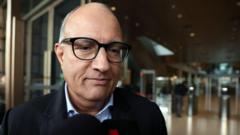**Sarkozy plans to appeal to the European Court of Human Rights after his conviction is upheld, requiring him to wear an electronic bracelet.**
**Nicolas Sarkozy's Corruption Conviction Upheld by France's Supreme Court**

**Nicolas Sarkozy's Corruption Conviction Upheld by France's Supreme Court**
**Former French President's Appeals Exhausted as Court Orders Electronic Monitoring**
Former French President Nicolas Sarkozy faces new legal challenges after France's highest court, the Cour de Cassation, confirmed his corruption conviction on Wednesday. The ruling mandates that Sarkozy, who held office between 2007 and 2012, wear an electronic monitoring device for one year as part of his sentence.
At 69 years old, Sarkozy expressed deep dissatisfaction with the ruling, stating that he is unwilling to accept the "profound injustice" it represents and intends to seek recourse from the European Court of Human Rights. Initially sentenced in 2021 to three years in prison—of which two years were suspended and one converted to electronic monitoring—Sarkozy was found guilty of attempting to bribe a judge by offering him a prestigious job in exchange for sensitive information linked to a separate case.
Judge Christine Mée, who presided over the previous ruling, highlighted that Sarkozy was fully aware of the wrongfulness of his actions, alongside his lawyer, which culminated in a "very bad image of justice" in the eyes of the public. Sarkozy's convictions were classified as influence-peddling and breach of professional secrecy.
Following Wednesday's decision by the Cour de Cassation, Sarkozy's lawyer, Patrice Spinosi, confirmed that his client would adhere to the court's ruling. However, with all domestic avenues for appeal exhausted, the anticipated appeal to the European Court of Human Rights will not postpone the enforcement of this legal judgment.
This historical ruling marks a significant moment in France's post-war political landscape, with Sarkozy becoming one of only a few former leaders to face legal consequences of this magnitude. Jacques Chirac, Sarkozy's predecessor, received a two-year suspended sentence in 2011 related to similar corruption charges. Chirac passed away in 2019.
At 69 years old, Sarkozy expressed deep dissatisfaction with the ruling, stating that he is unwilling to accept the "profound injustice" it represents and intends to seek recourse from the European Court of Human Rights. Initially sentenced in 2021 to three years in prison—of which two years were suspended and one converted to electronic monitoring—Sarkozy was found guilty of attempting to bribe a judge by offering him a prestigious job in exchange for sensitive information linked to a separate case.
Judge Christine Mée, who presided over the previous ruling, highlighted that Sarkozy was fully aware of the wrongfulness of his actions, alongside his lawyer, which culminated in a "very bad image of justice" in the eyes of the public. Sarkozy's convictions were classified as influence-peddling and breach of professional secrecy.
Following Wednesday's decision by the Cour de Cassation, Sarkozy's lawyer, Patrice Spinosi, confirmed that his client would adhere to the court's ruling. However, with all domestic avenues for appeal exhausted, the anticipated appeal to the European Court of Human Rights will not postpone the enforcement of this legal judgment.
This historical ruling marks a significant moment in France's post-war political landscape, with Sarkozy becoming one of only a few former leaders to face legal consequences of this magnitude. Jacques Chirac, Sarkozy's predecessor, received a two-year suspended sentence in 2011 related to similar corruption charges. Chirac passed away in 2019.














